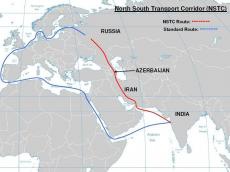Today.Az » Politics » Souring relations with Azerbaijan: How North-South Corridor's failure could erode Russia's economic resilience
08 February 2025 [14:50] - Today.Az

By Ferman Aydin In the current geopolitical landscape, Azerbaijan has become an increasingly significant player in Russia's economic strategy, particularly in terms of trade and transit. One of the most crucial aspects of this partnership is the "North-South" transport corridor, which runs through Azerbaijan and serves as a key route for trade between Russia, Iran, and the Persian Gulf. If relations between the two countries were to deteriorate, it would have profound consequences for Russia's economy, especially in terms of its access to crucial trade routes, energy supplies, and geopolitical influence in the region. The North-South Corridor: A Lifeline for Russia The North-South corridor is an international transportation network that connects Russia, Azerbaijan, Iran, and beyond. It is intended to create a seamless flow of goods from Russia to the ports of the Persian Gulf, bypassing Western sanctions and the limitations of traditional shipping routes. It’s particularly vital in the context of the economic isolation Russia faces due to sanctions, making it an alternative route for the delivery of goods to Iran and the wider Middle East. For Russia, Azerbaijan is not just a geographical bridge but a vital partner facilitating access to crucial markets. The corridor allow Russia to bypass traditional trade routes that are increasingly hostile due to Western sanctions. These routes offer Russia a lifeline, enabling it to sustain its trade with the Middle East, particularly Iran, which remains heavily affected by international sanctions. Without Azerbaijan’s role as the central link, Russia could face significant challenges in sustaining and expanding its economic footprint in these regions. The Consequences of Strained Relations Should Russia’s relationship with Azerbaijan sour, the "North-South" corridor would face significant disruptions, and the ripple effects would be felt throughout Russia’s economy. Trade flows could be delayed or even halted, cutting off access to some of the most important markets in the region. Trade and Transport Disruptions: If Azerbaijan were to reduce or block Russia’s use of its transport infrastructure, the flow of goods between Russia and Iran would be severely disrupted. The corridor is a direct path for goods like energy resources, machinery, and raw materials, which are essential to both Russia and Iran’s economies. Without this reliable route, Russia would be forced to seek more expensive and less efficient alternatives, increasing the cost of trade and harming economic growth. Geopolitical Isolation: Beyond trade and energy, the geopolitical ramifications of souring relations with Azerbaijan would be grave. Russia's position in the South Caucasus would be undermined, potentially paving the way for increased influence from other global powers, including the West and China. This could reduce Russia’s ability to exert control over key transit routes, undermining its strategic interests in the region. Higher Costs and Reduced Competitiveness: Without access to Azerbaijan’s strategic ports and transport routes, Russia would have to rely more on overland routes or shipping lanes controlled by rival powers. These alternative routes would be longer, costlier, and less reliable, leading to an increase in the cost of Russian exports and imports. Over time, this would make Russian goods less competitive on the international market, affecting both domestic producers and foreign trade relations. Loss of Influence in Central Asia and the Caucasus: Azerbaijan's role in the North-South corridor also connects Russia with Central Asia and the Caucasus, making it a central player in Russia’s influence over this vital region. A breakdown in relations with Azerbaijan could result in a loss of strategic influence in these areas, particularly as countries like Kazakhstan and Turkmenistan look to diversify their trade partners. A Delicate Balance The North-South corridor is far more than just a transport route for Russia; it is a lifeline to crucial markets in the Middle East, an essential conduit for energy exports, and a strategic asset for geopolitical leverage. If Russia were to sever or significantly damage its relationship with Azerbaijan, the economic fallout would be immediate and severe. Trade disruptions, rising costs, energy bottlenecks, and a weakened geopolitical position would all follow. In an increasingly isolated Russia, Azerbaijan’s importance as a key partner cannot be overstated. As the North-South corridor continues to play a pivotal role in Russia's economic future, the country must recognize the value of its relationship with Azerbaijan and work to preserve and strengthen this crucial partnership for the sake of its economy and global standing.
|